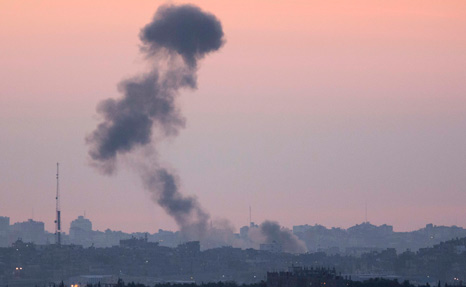On Operation Protective Edge, Justice, Law, and Victory
In the following op-ed, Admiral Ami Ayalon, former Director of the Israel Security Agency (Shin Bet) and co-head of IDI's National Security and Democracy project, asserts that the winner of today's wars is the side whose story is perceived as just, and argues that without a diplomatic track, Israel cannot win the war, even if the war is justified and Israel adheres to international law in the face of terrorists who violate it.

Published in: The Jerusalem Post
In Operation Protective Edge, as in any war, those who suffer greater losses are not necessarily more just, nor are those who kill in greater number necessarily the victors.
The balance between justice and victory is elusive and multi-faceted.
As an Israeli, I regard Protective Edge as a war justified by self-defense and conducted in adherence to international law in the face of brutal terrorists who turn their own civilians into human shields and cause their deaths in large numbers.
Many Palestinians regard the war as unavoidable and Hamas as the only means available to them to throw off the yoke of foreign occupation. They see the war as just despite their sacrifice. Ultimately, they believe, their struggle will bring Israel, despite all of its military might, to end the occupation—exactly as Israel yielded to Hezbollah terrorism and quit Lebanon, or yielded to the terrorism of the Second Intifada and quit Gaza. For all the deterioration of its operational capabilities and the substantial human suffering in Gaza, Hamas is today gaining strength in terms of Palestinian public support.
The important question is how the international community views the fighting. The question is especially important today, given globalization and the digital revolution that have turned the world into a global village and made international support a crucial condition for victory. The absence of support, or in extreme cases the imposition of political and diplomatic isolation including sanctions, turn any battlefield triumph to just another step toward losing the war.
Contrary to common wisdom, the international community does not set out positions in accordance with the laws of war or international law. The powers that delve into such matters are few and divided by varying interpretations. Some consider the laws of war to be obsolete, unsuited for the realities of counter-terrorism, and an obstacle to a nation-state prevailing in combat. Others believe that the laws of war enable the killing of civilians through procedural legalisms.
There is a rift between what international law permits in battle and what is perceived as just by the global public as it watches events unfold on television screens.
The public bases its position not on legal debates, but on the story it is told in the news media and Internet sphere. In the continuum that is the Middle East conflict, this narrative guides the public's decision on who is just and who is not, who is good and who is bad.
Thus swayed, the public influences its leaders to craft policies that are expressed in diplomatic resolutions—whether through the United Nations or through public pressure to force private companies to boycott products and markets.
So the winner of today's wars is the side whose story is perceived as just.
The world is now looking at Gaza and seeing hundreds of slain civilians, many of them children. What appeared, in the opening days, to be a just war of self-defense, thanks to circumspect government decision-making and diplomatic restraint, has morphed abroad into a cruel war against a defenseless enemy. The sand in the hourglass of the perceived justness of Israel is running out.
This, therefore, is what we must do:
Israel has a winning story: the story of Israel in the pre-1967 borders, working toward a reality in which two states exist side by side for two peoples, Jewish and Palestinian. This, in international eyes, is a just narrative. As part of such a perception, even harsh images from the fighting would be understood as self-defense. This can be seen from the fact that there was international support for Israel in the early 1990s, when a diplomatic process existed in parallel to an uncompromising battle against Palestinian terror. But if the world sees the Israeli story as the story of Israel struggling to maintain its occupation and settlement-building, then even a justified fight against rockets and tunnels that threaten civilians will not be seen as just.
I am not naive. The rocket and tunnel threats are intolerable and we must eliminate them. But in the absence of a diplomatic track telling the story of two states for two peoples we will not win the war, even if we are victorious in battles.
Thus, as part of any framework for ending the fighting in Gaza, we must create, alongside the demands for demilitarization and for deepening the involvement of the Palestinian Authority and the international community in the border crossings, a diplomatic horizon telling the world the story of a Jewish, democratic Israel co-existing with a Palestinian state.
To be candid, I personally believe that the only way to sustain Zionism—by which I mean the perpetuation of a Jewish, democratic Israel in the spirit of the Declaration of Independence—is by making the two-state solution a reality. I do not see this as yielding to foreign opinion but a realization of what, from the outset, the founding fathers of Zionism defined as true victory.
The views in this article represent the views of the author and do not necessarily represent the views of the Israel Democracy Institute.
Admiral Ami Ayalon is a Senior Fellow at IDI and heads the National Security and Democracy and Liberal Democracies Facing Asymmetric Conflicts projects. He is the former director of the Israel Security Agency (Shin Bet) and co-founder of Blue White Future.
